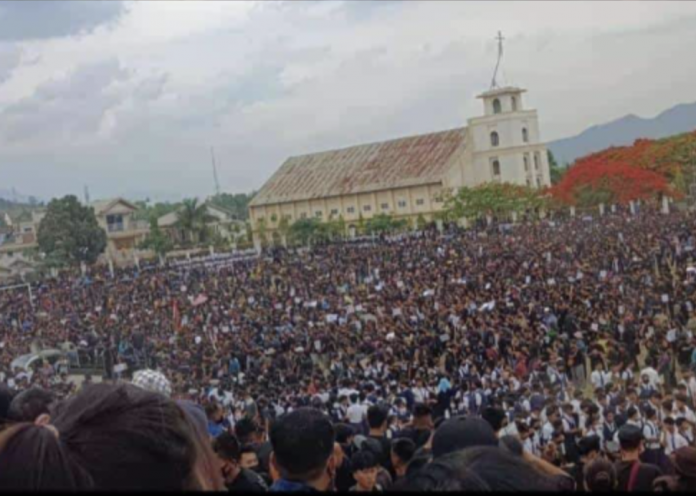Violence has erupted in Manipur, in Northeast India, claiming 60 lives, burning and destroying 50 churches, and displacing tens of thousands of people. Most of the dead are believed to be Christians.
According to Indian media, 10,000 troops have been brought in to restore order. At the same time a hearing of India’s Supreme Court claims there is no persecution against Christians in the country.
Indian media reports that violence erupted in several states from May 3, focused mainly in the Imphal Valley and Churachandpur.
‘Shoot on sight’
Soldiers have been sent in with orders to shoot on sight to restore order and curfews have been imposed.
Reports coming from India say Christians have been attacked in 27 villages, sometimes in plain sight of state police and military, while mobs roamed the streets.
Meanwhile the Evangelical Fellowship of India (EFI) and other parties have filed a petition at the country’s Supreme Court, calling for an agency to be set up to monitor attacks against Christians in the country.
The EFI, along with Archbishop Peter Machado of Bangalore and the National Solidarity Forum have brought the petition to try to halt what they claim are widespread attacks against Christians in the country.
In response, the government has denied that any persecution is taking place against Christians in India.
Instead, the government claims that any trouble Christians face is from personal disputes rather than communal crimes.
Religious nationalists
The Evangelical Fellowship of India has pointed out to the court that the government itself has disclosed that political groups linked to the ruling party have been involved in communal crimes.
They say that ultra-nationalist right-wing organisations such as the ‘Hindu Sangathan, Hindu Vadi Sanghatan, Hindu Jagran Manch, members of RSS, Bajrang Dal, VHP’ have been involved in the attacks.
The petitioners claim a rising tide of violence against Christians in the world’s largest democracy. They report 505 instances of assault in 2021, rising to 598 in 2022. And they say that in the first two months of 2023, there have been 123 assaults.
Pattern of attack
They report the attacks all follow a similar pattern. Large groups gather outside prayer meetings in homes or churches and force their way in to disrupt the meetings. They assault members and drag the pastor away, then register a legal claim against him alleging the forced conversion of Hindus.
And where Christians press charges of attack, counter charges are filed in return against them.
According to LiveLaw India: ‘While Christians and their priests are forced to remain a long time in jail without bail, no instance has been reported where the assailants had to spend any time under detention.’
The Evangelical Fellowship of India is calling on the Supreme Court to set up an independent agency to monitor the persecution of Christians. They say the state has failed to protect Christians from widespread violence, including attacks at places of worship and prayer meetings, incited by hate speech.
Anti-conversion laws
They say such attacks became widespread across several states from 2021, coinciding with the passing of anti-conversion laws. Twelve states have now passed laws to limit the freedom of Christians and Muslims to share their faith with Hindus, while Hindus remained free to convert those of other faiths.
The government’s response in the Supreme Court is to deny any persecution against Christians and to allege the petition by the Evangelical Fellowship of India relies on baseless and unverified reports.
Violence against Christians in India has increased since the nationalist BJP took power in 2014.
‘Systematic attack’
Bishop Joseph D’Souza, of the Good Shepherd Church in India, has put out written and video statements about the eruption of violence in Manipur.
He says: ‘The primary victims are the Christians. In this uncontrolled violence that took place in Manipur it was a systematic attack on the churches. I am told that in the plains almost all the churches are destroyed.
‘We are hearing large numbers. BBC Hindi says at least 59 people are killed. Some talk of 10,000 people [displaced from their homes], some talk about 20,000 people.’
Other sources now put the numbers displaced as high as 23,000.
Bishop D’Souza suggests factions are stirring up tribal rivalries to attack Christians. He adds: ‘There is no question about tribal Christians being in the middle of the storm that has erupted in Manipur at this time.
‘The situation in our country is very tender. This kind of thing can happen now anywhere in India. Pray for Manipur and our people.’
In its annual Persecution Trends report Release International highlights the growing violence against Christians in that country.
‘We call on India’s government to recognise the reality facing growing numbers of Christians in India today,’ says Release International CEO Paul Robinson. ‘Violence is spreading, usually linked to religious ultra-nationalists.
‘Many Indian people of goodwill struggle to see their country in this light. But we call on those people of goodwill to investigate the growing suffering of their Christian citizens and to act to prevent the worsening culture of intolerance and violence in their country.’
‘Mourning’
The Evangelical Fellowship of India has also put out a statement about the violence in Manipur. They say: ‘We mourn the loss of innocent lives, destruction of homes, property, and the burning of multiple churches. Our hearts ache for the families left grieving.
‘We urge the government to take immediate measures to restore peace and ensure the safety and security of all its citizens.
‘As a Christian body, representing evangelicals in India, we stand for the values of love, peace, and justice. We believe that every human being is made in the image of God and deserves to be treated with dignity and respect. The recent incidents of violence go against these values and have caused great harm to the people of Manipur. May the peace of Christ be with us all.’
Release International operates in around 30 countries. It works through partners to prayerfully, pastorally, and practically support the families of Christian martyrs. It supports prisoners of faith and their families; Christians suffering oppression and violence, and those forced to flee.










